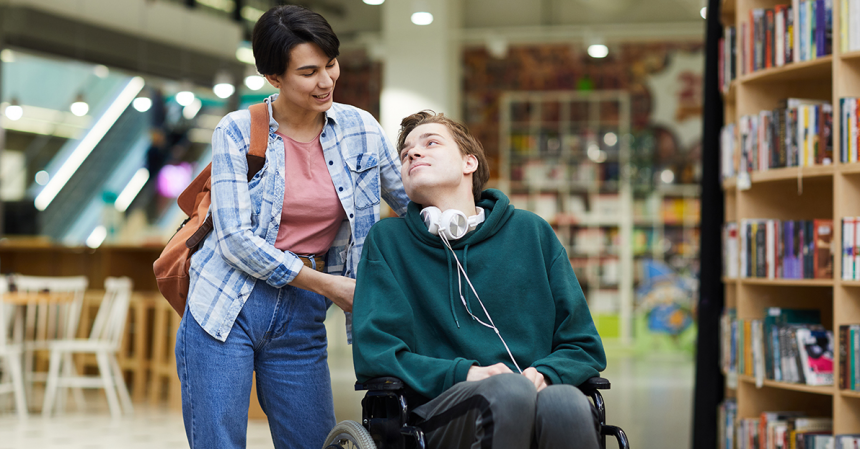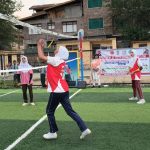In Jammu and Kashmir, as well as in the rest of India, children with special needs often face exclusion from society after turning 18. This is because most inclusive schools, special schools, and day care centers inform parents that they can no longer provide services for individuals with special needs beyond this age, citing institutional rules and policies.
Turning 18 is widely seen as a major milestone a step into independence, adulthood, and self-determination. For many young people, it is an exciting time filled with opportunity. However, for individuals with special needs and their families, this milestone often brings uncertainty and anxiety. Instead of marking a new beginning, it can feel like the end of the vital support systems that were once readily available.
The transition into adulthood should not be a cliff; it must be a bridge. It is time to reframe how we support young people with disabilities as they enter adulthood by turning toward them, not away. Parents of children with special needs in Jammu and Kashmir, as well as across India, are deeply concerned about their children’s future, as they struggle to find appropriate resources, vocational training centers, and opportunities for university admission after the age of 18.
The Transition Gap: A Critical Period
Children with special needs often thrive with the help of a coordinated network of support services, including educational accommodations, therapeutic interventions, and medical care. These supports are usually provided through pediatric systems and school-based programs. However, when a child turns 18, many of these services are reduced or discontinued entirely. The adult service systems that are supposed to take over are often underfunded, fragmented, and challenging to navigate.
This critical period often called the “transition cliff” can leave families feeling abandoned at a time when support is needed most. Without careful transition planning, young adults may face social isolation, unemployment, inadequate healthcare, and housing insecurity. For many parents and caregivers, the pressing question becomes, what happens now?
Planning for Adulthood Early
Preparing a child with special needs for adulthood is a journey that must begin well before their 18th birthday. Effective transition planning should start in early adolescence, ideally by age 14. Schools play a pivotal role in this process and, in many countries like USA, England, Australia etc, are legally required to develop an Individualized Transition Plan (ITP) as part of the student’s Individualized Education Program (IEP).
These plans must be comprehensive, forward-looking, and centered on the unique strengths and goals of each individual. They should address critical areas such as meaningful employment, independent living, and access to higher education. Most importantly, young people must be empowered to lead this process with their voices, choices, and dreams driving every decision. Equipping youth with disabilities to envision and shape their own future is not just supportive it is transformative, and absolutely essential.
Inclusive Employment Opportunities
One of the most significant challenges faced by young adults with disabilities is accessing meaningful, sustainable employment. The unemployment and underemployment rates among individuals with disabilities remain disproportionately high compared to the general population. This disparity is not due to a lack of talent or potential, but rather a lack of opportunity, accessibility, and support.
With the right interventions including targeted vocational training, individualized job coaching, and appropriate workplace accommodations individuals with disabilities can excel across a wide range of careers. These supports not only enhance job readiness but also build confidence, independence, and long-term employability.
Rights of Persons with Disabilities (RPwD) Act, 2016 addresses several key aspects of disability rights in India. This Act highlighted that Sections 19 to 23 of the Act outline the responsibilities of the government in the areas of vocational training, self-employment, and employment for persons with disabilities.
According to Section 19, the government is mandated to formulate schemes and programs including concessional loans to facilitate and support the employment of persons with disabilities, with a special focus on vocational training and self-employment.
Sections 20 to 23 require the government to ensure reasonable accommodation and a barrier-free environment for employees with disabilities. These sections also mandate the formulation of an equal opportunity policy by employers to promote inclusivity and non-discrimination in the workplace.
Collaborative programs that connect schools, vocational training centers, and local businesses are critical to bridging the gap between education and employment. These partnerships provide students with hands-on, real-world work experience and help ease the often-difficult transition from school to the workforce. By investing in inclusive employment pathways, we can create a future where every young person regardless of ability has the opportunity to contribute, grow, and succeed.
Continuing Education and Lifelong Learning
Higher education is not out of reach for students with disabilities, but significant barriers still stand in the way. While colleges and universities are legally required to provide reasonable accommodations, many lack the comprehensive, coordinated support systems that exist in high schools. As a result, students must often become their own advocates, navigating complex systems, requesting accommodations, and asserting their rights as per RPWD Act 2016 all while adjusting to the demands of higher education.
This transition requires more than academic readiness; it demands strong self-advocacy, resilience, and a supportive network. Families and educators play a vital role in preparing students for this shift, ensuring they are equipped with the skills and confidence to thrive.
Several parents of young adults with special needs have reported that, although their children completed inclusive education in some CBSE schools in Srinagar, they faced significant challenges after turning 18. Once they transitioned out of school, they found a complete lack of accessible resources such as vocational training centers or inclusive college and university admission opportunities. As a result, many of these young adults now face isolation, spending their days at home without meaningful engagement or opportunities for growth.
Parents have also shared that only a handful of NGOs in Jammu and Kashmir are working in the disability sector, and even these are limited in scope. Most offer outdated vocational training programs such as paper bag making, basic handicrafts, and tailoring which may only serve individuals with moderate levels of disability.
There is a glaring absence of modern, skills-based training and no structured system in higher education institutions and NGOs to support students with mild disabilities who could thrive with the right accommodations and inclusive environments. Some Parents of special need kids reported most children with disabilities in India grow up without being taught essential life or vocational skills.
They emphasized that the majority of special needs children across the country are still engaged in age-old, repetitive, and mundane tasks that often serve the needs of others rather than empowering the individuals themselves. There is a general lack of innovation in the area of skill development for adults with disabilities, and a clear absence of the use of modern tools such as machine learning and technology to aid in their growth and independence.
Some Disability Rights Activists further pointed out that Section 29 of the Rights of Persons with Disabilities (RPwD) Act focuses on culture and recreation, and mandates that the appropriate government and local authorities must take measures to promote and protect the rights of persons with disabilities to fully participate in cultural and recreational activities.
This gap between school and adulthood is not just a policy failure it’s a failure of vision. Without a coordinated and inclusive framework for higher education and workforce integration, the potential of an entire population is being overlooked. Urgent reforms are needed to build Inclusive post-school systems that empower all individuals with disabilities to lead dignified, fulfilling lives.
Alternative pathways including community colleges, vocational training programs, apprenticeships, and life skills courses offer equally valuable opportunities for growth, tailored to diverse strengths and goals. These options should be recognized and respected as legitimate routes to personal and professional fulfillment.
Education should not come to a halt at age 18 — for many students with disabilities, it is only the beginning of a lifelong journey of learning, empowerment, and discovery. Every individual deserves the chance to pursue their potential, wherever that path may lead.
Building Independent and Supported Living
Living independently is a meaningful goal for many young adults including those with disabilities. But independence does not mean isolation. True independence is about having choices, control over one’s life, and the ability to participate fully in the community, with the right supports in place.
Unfortunately, for many individuals with disabilities, finding safe, accessible, and affordable housing remains a major barrier. Public policies and housing initiatives must urgently prioritize the development of inclusive, community-based living options that support autonomy while offering connection and care. These environments should foster integration not segregation and provide access to transportation, healthcare, employment, and social networks.
When young adults with disabilities are given the opportunity to live in supportive, inclusive settings, they gain far more than just a roof over their heads they gain dignity, purpose, and a sense of belonging.
Independent living, tailored to individual needs and strengths, empowers people to build meaningful lives on their own terms. We must shift away from outdated, institutional models and invest in innovative housing solutions that recognize independence as a right not a privilege for all.
The Role of Families and Caregivers
Families continue to serve as the cornerstone of support for individuals with special needs not only throughout childhood but well into adulthood. As young people age out of pediatric services and school-based programs, the burden of navigating complex adult service systems often falls squarely on the shoulders of parents and caregivers. They become advocates, case managers, healthcare coordinators, and financial planners—roles they may not have anticipated but willingly take on out of love and necessity.
Supporting families during this critical transition is not optional it is essential. This means providing timely access to accurate information, emotional support through counseling and peer networks, and practical resources such as respite care and caregiver training. It also involves ensuring families receive legal and financial guidance around key issues like guardianship, supported decision-making, power of attorney, and long-term financial planning.
When families are empowered with the tools, knowledge, and emotional reinforcement they need, they are better equipped to ensure continuity of care and stability for their loved ones. A robust family support system reinforced by strong community ties and professional networks can dramatically improve the long-term well-being, independence, and quality of life of individuals with disabilities. Investing in family support is not just an act of compassion; it is a strategic necessity for building inclusive, resilient societies.
A Call to Action
The transition into adulthood is a shared responsibility one that requires collective commitment from governments, educational institutions, NGOs, healthcare providers, employers, and communities. Together, we must ensure that young adults with disabilities are not overlooked or left behind at this pivotal stage of life.
We must champion policies that extend critical supports beyond the age of 18, strengthen inclusive education and employment opportunities, and promote accessible, independent living. These are not privileges they are rights that uphold the dignity and potential of every individual.
Turning 18 should not signal an end to care and connection. It should mark the beginning of a new chapter a celebration of growth, promise, and possibility. When we invest in thoughtful, person-centered transitions, we affirm the worth of every young adult and reinforce a more just, inclusive society.
Empowering young people with disabilities to lead full, meaningful lives is not just the right thing to do it is a reflection of who we are and the future we choose to build. Turning 18 is a milestone, not an endpoint.
(Author is Sr. Pediatric Rehab Therapist & Social Worker (MSW) Working for Disability & Child Rights. Feedback: [email protected])










